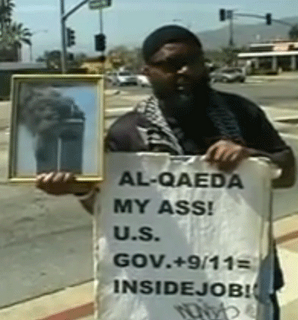 A local supporter of Muhammed Abdullah, my first hour guest tonight on Truth Jihad Radio (5-7 pm Central, AmericanFreedomRadio.com), just wrote to say that actually the Southern California 9/11 truth community DID turn out in force for Muhammad’s court case last June. My response: “I wasn’t complaining so much about the trial not being publicized (though I can’t understand why 911blogger didn’t pick it up) but about the lack of reaction to the recent DHS raid on his house. It’s pretty obvious they were just harassing him for his activism. I would think his fellow activists would want to protest big time. Letting a truther get raided by DHS without major protest sets a bad precedent.”
A local supporter of Muhammed Abdullah, my first hour guest tonight on Truth Jihad Radio (5-7 pm Central, AmericanFreedomRadio.com), just wrote to say that actually the Southern California 9/11 truth community DID turn out in force for Muhammad’s court case last June. My response: “I wasn’t complaining so much about the trial not being publicized (though I can’t understand why 911blogger didn’t pick it up) but about the lack of reaction to the recent DHS raid on his house. It’s pretty obvious they were just harassing him for his activism. I would think his fellow activists would want to protest big time. Letting a truther get raided by DHS without major protest sets a bad precedent.”
Reports on Muhammad’s court case:
http://m911t.blogspot.com/2009/06/muslim-marine-vet-for-truth-silenced-by.html
http://m911t.blogspot.com/2009/06/compromise-reached-in-restraining-order.html
Below is the email from the Southern California supporter of Muhammed.
Hi, Kevin! Funny you should mention Muhammed Abdullah. The local 9/11 Truth groups (WeAreChangeLA and Orange County 9/11 Truth) did publicize his trial, went to the courthouse to support him, and even organized an impromptu demonstration nearby. FYI, here is my comment after his 2nd court hearing, when he cross-examined complainants and agreed to seek a compromise with the city:
1. As I said after the hearing was over, what a shame that Muhammed did not have an attorney, or at least some close friend who would be knowledgeable enough to dissect the incriminating testimonies and coach him into cross-examining. The witnesses would have gone underground under questioning by even an amateurish lawyer, and the city attorney would have backtracked as fast as he could. Once again, a court illustrated that money makes a lot of difference.
2. Indeed, the testimonies were, at best, very weak:
· The ladies related single, one-time incidents.
· Their feelings were subjective.
· Much of the fear had a sexual overtone, yet there was no mention of any practical action on Muhammed’s part that could be construed as sexual harassment (looking at breasts or crotch or high heel shoes, suggestive postures or gestures, etc.).
· The ladies were afraid enough to launch a legal action, but not enough to consult a psychotherapist; kindly note that public servants, unlike most of us, benefit from socialized or quasi-socialized medicine.
3. Had Muhammed known how to cross-examine, the 3rd lady may have declined to testify:
· He would have asked detailed questions to establish the weakness of their testimonies (see above). In fact, when the 2nd witness mentioned that she vividly remembered the dress or skirt she was wearing, he could have asked what else she was wearing, and then what sexually suggestive attitude he adopted if any.
· Since the witnesses had criminal expertise, they had undoubtedly some training on how to handle dangerous people. If they were afraid of Muhammed, how did they handle truly dangerous situations within the scope of their jobs?
· This would have allowed him to legitimately raise the question as to whether they believed he was making up his allegations regarding 9/11 –“Your honor, I’m trying to make sense out of the witness’ fear; maybe she thinks I am inventing what I claim.”
· He would have asked the ladies why they were not afraid enough to formulate their complaints right away.
· He would have asked why they supported a legal action for a one-time problem instead of having the police give him a formal complaint and an invitation to use more restraint. In fact, wouldn’t this have been an elementary action on the part of public servants bent on serving the public?
· He would have steered the debate away from the fact that he was speaking and into the fact that a small aspect of his speech bothered a few people on one occasion.
· This would have made it obvious that the City’s court action was a waste of public resources and that the solution was just a bit of dialog between the Police Department and Muhammed. The judge would have ended up wondering why the City did not initiate that dialog rather than waste his time.
4. The judge’s “compromise” is what the French would call the use of a hammer to kill a fly. The judge –as a good cross between a politician and an attorney, with a limited sense of ethics like most public officials –probably knows very well what he is doing: giving Muhammed enough help so he cannot argue on appeal that the judge was unfair to him, but not enough to make the case against him crumble; he is earning some points with his Masters while appearing as a defender of the right to free speech.
5. The judge took pride in his blissful ignorance, giving Muhammed his materials back under the pretext that they were irrelevant to the case rather than accepting a challenge to learn something.